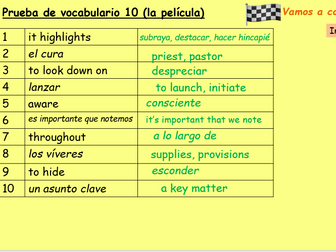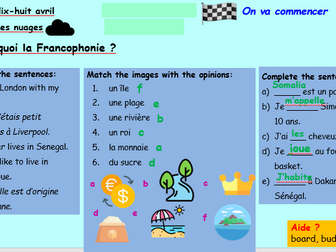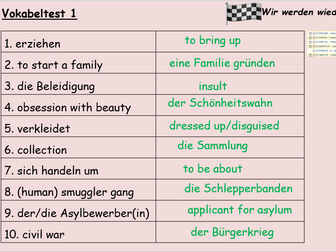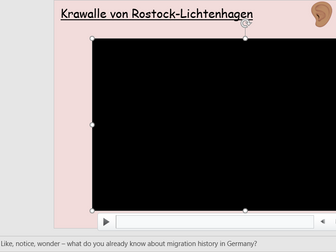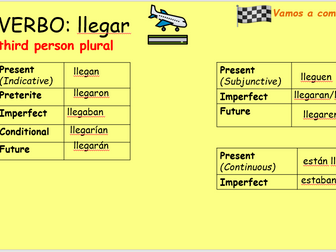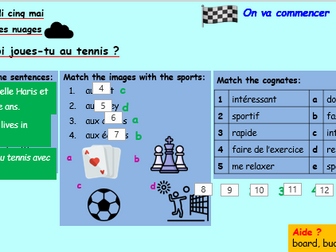A Level Spanish Knowledge Organiser
<p>Space for students to track their assessments, note new vocab, etc.</p>
<p>PS: will most likely have a new edit by this time next year; late to the game but finally trialling giving students knowledge organisers for KS5, not just KS3/4</p>
A Level German Knowledge Organiser
<p>Space for students to track their assessments, note new phrases, etc.</p>
<p>PS: will most likely have a new edit by this time next year; late to the game but finally trialling giving students knowledge organisers for KS5, not just KS3/4</p>
<p>(credit to @nikolettapy for slimming down textbook vocab lists)</p>
Bundle: la casa de Bernarda Alba
<p>La casa de Bernarda Alba bundle, used with year 13 Spanish following AQA. Starters were vocab tests, which I have also uploaded.</p>
<p>As is my trademark, everything is unfinished but hopefully a helpful starting point for those who have never taught. Used this for two year 13 cycles. Improving as I go, learning as I go. Lots to improve on still.</p>
<p>An unfinished scheme of work, past essay questions and essay writing resources are also included. No specific essay lessons because practice started very early, so it’s slowly built up throughout the course.</p>
<p>Lots of resources from TES helped to create, but also heavily relied on the Hodder Guide. Where there are gaps, I used text from Hodder and treated it like a university lecture: teacher reads, students take notes then summarised together. The Cervantes Theatre performance is also a very important part of study.</p>
La casa de Bernarda Alba vocabulary lists
<p>Still needs more development, but hopefully useful as a base.<br />
Includes words from La casa de Bernarda Alba vocabulary lists and essay phrases lists from Quizlet, as well as back of the Manchester University Press edition. Students join a Quizlet group to aid independent study, but they are also supported to independently revise content using their notes, etc.</p>
<p>Context: Serves as a starter to a double fortnightly film study lesson. Start studying the film in the first few weeks, and writing essays very early too to try and banish any fear over it before it can set in.</p>
undefined
Bundle: el laberinto del fauno
<p><em>El laberinto del fauno</em> bundle, used with year 12 Spanish following AQA. Starters were vocab tests, which I have also uploaded.</p>
<p>As is my trademark, everything is unfinished but hopefully a helpful starting point for those who have never taught. Used this for two year 12 cycles. Improving as I go, learning as I go.</p>
<p>An unfinished scheme of work, past essay questions and essay writing resources are also included. No specific essay lessons because practice started very early, so it’s slowly built up throughout year.</p>
<p>Lots of resources from TES helped to create, but also heavily relied on the Hodder Guide. Where there are gaps, I used text from Hodder and treated it like a university lecture: teacher reads, students take notes then summarised together.</p>
Qu-est-ce que tu vas faire ce weekend ?
<p>Introducing near future to high attaining year 8 group using the topic/content of hometown. Depending on timing, could be two lessons.</p>
<p>Disclaimer: as always, don’t expect a totally finished product, and some slides may be recognisable from other users</p>
Aimes-tu ton collège ?
<p>Made for year 9 mid attainers, may need a bit of tweaking. Includes some peer book marking.</p>
El laberinto del fauno Vocabulary Tests
<p>Still needs more development, but hopefully useful as a base.<br />
Includes words from El laberinto del fauno vocabulary lists and essay phrases lists from Quizlet. Students join a Quizlet group to aid independent study, but they are also supported to independetly revise content using their notes, etc.<br />
Context: Serves as a starter to a double fortnightly film study lesson. Start studying the film in the first few weeks, and writing essays very early too to try and banish any fear over it before it can set in.</p>
C'est quoi la francophonie ?
<p>Lesson(s) based around worksheets originally from TES author: littlemissmo, but have been ‘renovated’. Worksheets finished, but PowerPoint still needs some refining, hopefully it can just be helpful as a base/skeleton.<br />
Context: First in ‘Destination Vacances’ unit with year 9 lower attaining students, have previously done other lessons on Francophonie in year 7 and year 8, but not enough. (Still working on making culture more a part of lessons)</p>
<p>Please also bear in mind that their may be language mistakes as I am not native.</p>
Que faut-il faire pour rester en forme ?
<p>PowerPoint Lesson - giving advice on being healthy and infintive structure embedding</p>
Introduction (+re-intro) to GCSE French
<p>Baseline test will need adapting based on your KS3 topics/GCSE exam board.</p>
A Level German Vocabulary Tests
<p>Something to work on/with as I plan to add more to it e.g. visuals, more context for some words, etc., but hopefully a helpful base. Made for year 13 students, units added as we went through the year but year 12 units and GCSE high frequency vocabulary from the start-ish.</p>
<p>Bit of context: Students joined a Quizlet group with vocabulary lists from the Oxford AQA AS and A2 textbooks to support independent language study. Some lessons they had starters on grammar (conjugation) or translation, these slides were used for the vocabulary starters.</p>
End of Year 8 Writing Revision
<p>PowerPoint Lesson - revising content for end of year French assessment</p>
<p>AQA Foundation style with following topics:<br />
photo – family and home<br />
40 – eat, drink, meal, restaurant<br />
translation – above<br />
90 – where you live, activities in town, next weekend, last weekend</p>
<p>Adapted for lower prior attainers from resource by @MissYianniMFL</p>
A Level German: Cultural Intro - Immigration
<p>Cultural introduction to AQA A2 topic Einwanderung using real life event from 1992, Krawalle von Rostock-Lichtenhagen, as well as trailer of fictionalised account from ‘wir sind jung, wir sind stark’.</p>
<p>As usual, PowerPoint could do with some refining, just here for inspo :).</p>
Introduction to GCSE Unit 8: Travel and tourism
<p>Lesson to help get students engaged with topic in a creative way before mostly following the textbook (AQA GCSE German)</p>
Mis pasatiempos: tarsia
<p>Tarsia puzzle resource created for year 8 to help revise the hobbies topic.</p>
<p>NB: takes forever to cut out, but can be re-used for years after</p>
Spanish Conjugation Tests
<p>as usual, not 100% beautifully finished, but mostly there</p>
<p>multiple tense and multiple person conjugations used as a starter with A Level Spanish classes, tend to alternate between vocabulary and conjugation tests in textbook (paper 1/3) lessons</p>
<p>including one slide testing ‘vos’ aka <em>rioplatense</em> Spanish, I use reverso context when students need to see the usage of particular structures e.g. subjunctive - hayas cambiado</p>
Introduction to GCSE German
<p>Baseline test that will need adapting based on your KS3 topics/GCSE exam board. x</p>
<p>PS this lesson PPT not as polished as those for French, apologies</p>
Pourquoi joues-tu au tennis ?
<p>Originally designed for 25 minutes with a mixed attainment year 7 class. Unit: <em>Mon temps libre</em></p>
